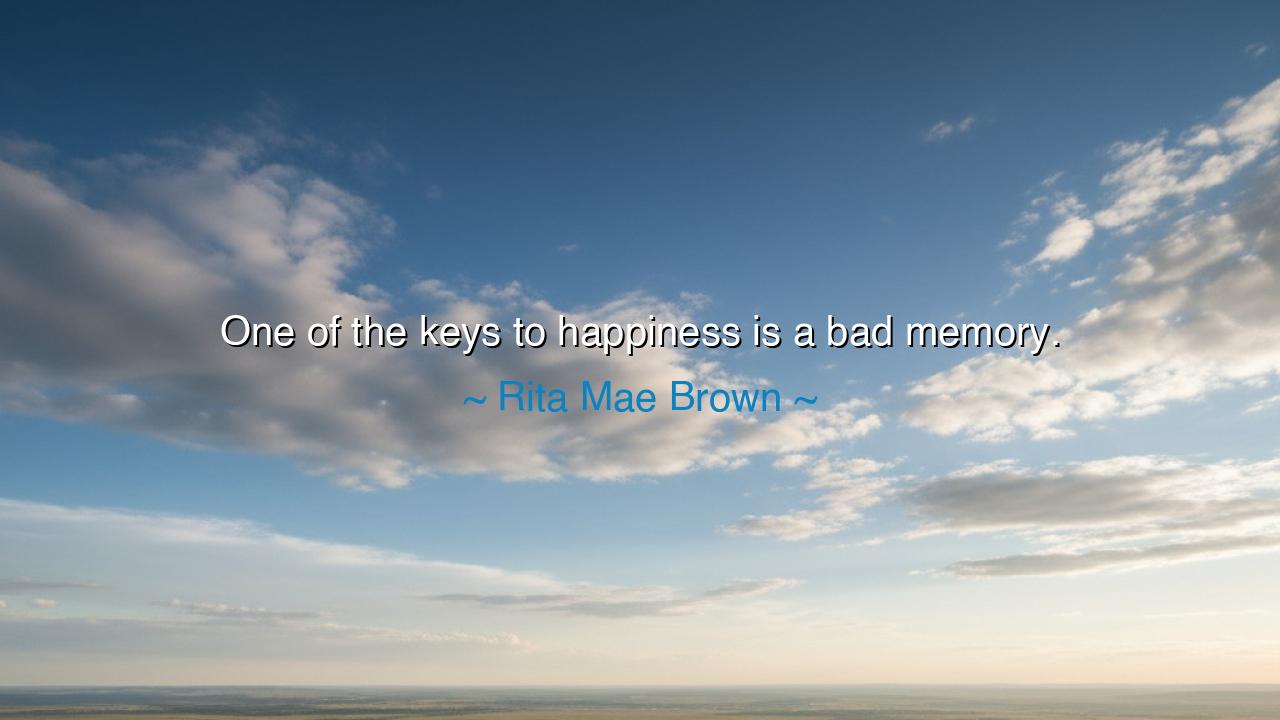
One of the keys to happiness is a bad memory.






Hear now the curious yet profound wisdom of Rita Mae Brown, who once said: “One of the keys to happiness is a bad memory.” At first, these words may seem light, even playful—but beneath their simplicity lies a truth of ancient depth. For what she calls a bad memory is not the absence of intelligence, but the art of forgetting that which burdens the heart. To forget a wrong, to release an old sorrow, to cast aside the heavy stones of regret—these are acts not of weakness, but of wisdom.
From the dawn of time, humanity has been both blessed and cursed with memory. It preserves the songs of triumph and the lessons of pain, yet it can also bind the soul in chains of bitterness and shame. The wise have long known that to live fully in the present, one must sometimes let go of the past. The ancient Stoics taught that what is beyond our control must not trouble us, and what is gone cannot be changed. Rita Mae Brown, a writer and rebel of her age, echoed this timeless truth in modern words: that happiness blooms only when the soil of the mind is cleared of the weeds of yesterday.
Consider the tale of Nelson Mandela, who after twenty-seven years in a prison cell emerged not with vengeance, but with peace. He said, “Resentment is like drinking poison and hoping it will kill your enemy.” In his long captivity, he learned to forget—not in the sense of erasing memory, but of forgiving it. He remembered the struggle, yes, but not the bitterness. That is the essence of Brown’s wisdom: that a bad memory can be a sacred blessing when it allows us to live unshackled by the ghosts of what has been. For the one who cannot forget an injury is forever imprisoned by it, while the one who releases it walks free beneath the open sky.
Even the ancients understood that joy cannot survive in the company of endless remembrance. Buddha taught that suffering is born from attachment—to desire, to pride, to pain. To let go is to awaken. To cling to every slight or sorrow is to live in the shadow of what no longer exists. The bad memory of which Rita Mae Brown speaks is thus the mind’s way of protecting the heart. Forgetting is not ignorance—it is healing. It is the mercy of nature that softens grief with time, and turns tragedy into wisdom rather than torment.
Yet there is a balance to be kept. Forgetting the lessons of the past would be folly; to lose history is to wander blind. But to choose what to remember—this is mastery. Remember the love, not the betrayal. Remember the laughter, not the tears. Remember the lesson, not the wound. For happiness dwells not in the mind that clings, but in the spirit that releases. The river flows because it does not hold itself back; the tree grows because it lets its dead leaves fall.
In our own lives, how often do we replay old failures or grudges, feeding them with the fire of memory? How often do we let the words of others echo in our minds until they drown out peace? Brown’s words call us to a gentler way: to practice selective forgetting, to free the soul from what no longer serves it. When you stumble, forgive yourself swiftly. When others wrong you, do not carry their actions longer than they did. For every wound that you keep alive through memory, you die a little each day.
Therefore, O listener, let this teaching be written upon your heart: happiness is not found by perfecting life, but by lightening its weight. Let your past become mist upon the morning wind—visible for a moment, then gone. Keep only the warmth of what was good, and let the rest return to silence. Each day you forget a pain, you make room for joy to dwell. Each memory you release becomes a seed of peace.
So live as the river lives—ever flowing, ever cleansing, ever renewing. For truly, one of the keys to happiness is a bad memory, and blessed is the one who learns not to remember every sorrow, but to remember instead how to begin again.






AAdministratorAdministrator
Welcome, honored guests. Please leave a comment, we will respond soon